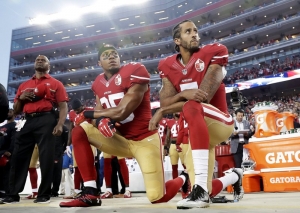By TIM DAHLBERG

NFL owners were busy handing out prizes at their meeting in Atlanta, doling out Super Bowls to various cities and giving Nashville the 2019 draft.
Then they gave one to themselves: A new anthem policy adopted with the fervent hope that the protests sparked by Colin Kaepernick will go away and the golden goose that is the NFL will continue to soar untouched.
Stay in the locker room if you wish during the national anthem. But don’t even think about kneeling on the sideline where you can be seen.
This wasn’t an attempt to settle a real issue, not even close. This was strictly for self-preservation and to keep any protest off the TV cameras and away from the prying eyes of the current tenant of the White House.
And guess what? It just might work.
Not for the players, who will lose whatever rights they had left. But they’ve always been expendable anyway, in a league that for years stood by doing nothing as their brains were scrambled by hits on the field.
No, this one is for Jerry Jones and his fellow billionaires.
They’re the ones who want desperately to move any protests about social injustice to the locker room, where no one but the towel guy will notice. They’re the ones who called the new policy a compromise, yet made no real concessions to protesting players and didn’t even bother consulting the players’ union on the plan.
Their new rules are as simple as they are absolute: If you want to protest, do so by staying in the locker room during the national anthem.
Then get your rear out there and play a game.
Vice President Mike Pence was quick to cheer, sending out a tweet with the hashtag #Winning. It was President Donald Trump himself who really put the heat on NFL owners last season by saying it was a disgrace to allow players to take a knee during the anthem.
Then as television ratings sank and sponsors started to get nervous, owners figured they had better move to protect their cash cow.
Meanwhile, players have little choice but to accept it — assuming they wish to remain employed.
“That’s their decision to make,” Redskins corner Josh Norman said. “They’ve pretty much got the teams. They make those decisions. We just got to go through with it, I guess.”
Though the NFL was quick to triumph the fact the new policy passed by a unanimous vote, it’s clear some owners are not as comfortable with it as others. The Buffalo Bills issued a statement saying they would rather work closely with players on social issues than issue fines for kneeling during the anthem, and the head of Kaepernick’s former team said his team abstained from the vote.
San Francisco 49ers CEO Jed York went a step further by saying other measures might also be taken, including a suspension of all concession sales during the national anthem.
“If we want to be sacrosanct, if we want to honor the flag, we’ve got to make sure we go through a litany of things,” York said. “We’re not going to force people to stand in their seats, but we’re certainly going to make sure we’re not profiting during that two or three minutes of time during the game.”
That, at least, is a step in the right direction. If players can’t kneel during the anthem, there’s no reason the beer guy should be able to keep pouring $12 brews.
Let’s just hope the anthem police have some sympathy for fans who might forget to take off their hats during the song.
So now the game will move on from who is kneeling on the sideline to who is in the locker room during the anthem. Fans and television cameras will scan the sidelines to see who is missing, and those who want to make political hay of it on either side will duly take note.
In the long run, though, the issue will likely fade away, just like NFL owners want it to. And that may not be such a bad thing, since the original purpose of highlighting social injustice has become twisted instead into a debate over the patriotism of NFL players.
Most of them are very patriotic indeed, just like most of the fans who watch them. They also have the right to speak up and protest outside their workplace, just like the fans who watch them.
But the bottom line is that NFL owners have every right to protect their business. They pay the salaries, and they decide the rules.
Now everyone else can decide whether they want to keep playing along.
____
Tim Dahlberg is a national sports columnist for The Associated Press. Write to him at [email protected] or http://twitter.com/timdahlberg